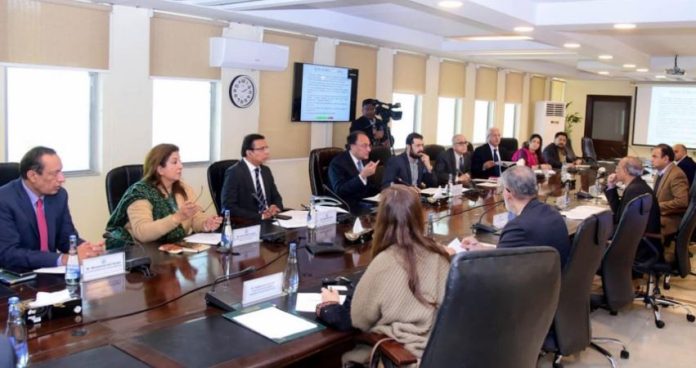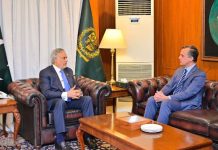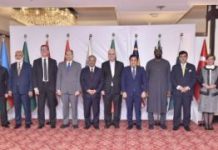ISLAMABAD, DEC 9 /DNA/ – A high-level delegation of foreign investors and business professionals, mostly based in the United States, called on Federal Minister for Finance and Revenue, Senator Muhammad Aurangzeb, at the Finance Division today.
The delegation put together by Ambassador Ali Jehangir Siddiqui of the JS Bank comprised leading entrepreneurs, business practitioners and professionals from diverse sectors, including technology, academia, and finance, with lead members such as Mr. Auren Hoffman, Chief Executive Officer of SafeGraph, Mr. Kristen Edwards Marqua (Hakluyt & Company), Michael Levi (The D.E. Shaw Group), Dr. Jeff Chang (Rad AI), and others.
Ambassadar Ali Jehangir Siddiqui opened the discussion by apprising the Finnace Minister about the composition of the delegation, the purpose of their visit and their interaction with different stakeholders during the visit so far. Advisor to the Finance Minister Mr. Khurram Shehzad and senior officers of the Finance Division and FBR were also present.
The Finance Minister welcomed the delegation and briefed them about the country’s recent macroeconomic progress, highlighting significant achievements in overcoming longstanding challenges. “Pakistan has historically struggled with twin deficits; however, due to improved export performance, the economy is now operating with a surplus in both fiscal and current accounts. Foreign exchange reserves have crossed the $12 billion mark, inflation has been brought down to single digits, and the policy rate is moving in the right direction,” he noted. He further elaborated on the government’s comprehensive reform agenda, encompassing privatization, SOE restructuring, rightsizing of the federal government, and pension reforms.
Senator Aurangzeb also addressed two existential challenges faced by Pakistan: rapid population growth and climate change. “With a population growth rate exceeding 2%, we face severe implications for food security, child stunting, and out-of-school children. Climate change exacerbates these vulnerabilities, making it imperative to secure both financial and technical assistance to tackle these issues effectively,” he remarked. He also mentioned that he has emphasized the importance of these priorities in discussions with international partners, including World Bank President Ajay Banga.
The briefing was followed by a detailed question-and-answer session. Addressing a query on implementing IMF conditions and structural reforms, the Minister remarked: “The willingness and ability to execute reforms are crucial. While we have significant work ahead, as long as we maintain commitment and momentum, and stay the course, we will achieve the desired outcomes.”
Responding to another question, he stressed the role of the private sector in driving economic growth. “Policy frameworks and continuity are the government’s responsibility, but the private sector must lead the economy. The government’s focus is on creating an enabling environment to support this transition,” he stated.
The delegation appreciated the government’s efforts in stabilizing the economy and discussed opportunities for collaboration in areas such as innovation, investment, and financial inclusion. The meeting concluded with a shared resolve to strengthen U.S.-Pakistan cooperation in achieving mutual economic goals and addressing shared challenges.












